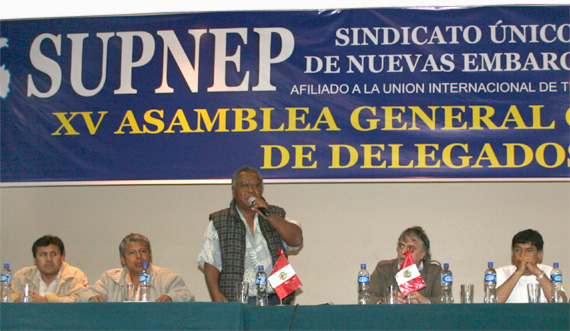|
From Oct. 21 to
23, the Union of New Vessel Fishermen of Peru (SUPNEP) held its General
Assembly. SIREL spoke with the Union’s secretary general, Juan Pedemonte, about
the outcome of the meeting and the challenges ahead.
-What is your
evaluation of this Assembly?
-All the
delegates present expressed their satisfaction at the progress that SUPNEP
is making. This approval meant that all the members of the Union’s steering
committee were reelected for a new term.
-Does the
steering committee expect to face many challenges?
-The same
challenges we’ve been facing for years, namely the defense of our jobs, which
means claiming our right to fish in the 200 miles of the
Grau Sea.1
-These are very
rich waters that attract the greed of many…
-Our sea is
very rich in fishery resources, which is why it has been invaded for years by
foreign vessels, which not only reduce the fish stock, but generate absolutely
no jobs or income for the country.
-The Assembly
approved a decision to oppose the signing of FTAs with the United States and the
European Union.
-A resolution
expressing our disagreement with the way the national government is conducting
negotiations for the signing of those FTAs was passed. They want to come
here and fish in our 200-mile zone and take away all our fishery resources.
European
and
Chinese vessels come into our waters, fish and take their catch to
the mother vessels at high sea - outside the 200-mile zone -, and they do this
year round. Then these mother vessels ship the catch off to their countries, as
if it were theirs. We cannot accept that.
-And having
waters so rich in food while so many Peruvians go hungry…
-That’s right.
Our people need to eat and our Grau Sea has enough resources to back a
food sovereignty policy and to export. There’s enough for both of those goals.
Peruvians
are malnourished because they suffer from protein deficiency. A possible
solution to that problem would be to find a way to distribute our fish to every
corner of the country. But to do that we first need to protect our fish
resources. The 17
largest fishery companies in the world have exhausted or are close to exhausting
their fishing grounds, and 13 have completely depleted their stock or have
gravely affected them. It’s a critical situation: 80 percent of the world’s
fishery resources are depleted.
|
Approximately 36 percent of all catches in the world are used to
manufacture animal feed.
|
-This is due to
overfishing, among other factors…
-Exactly.
Resources are threatened as a result of overfishing, which surpasses our seas’
capacity to replenish stock. Scientists forecast the disappearance of commercial
fish species by 2048.
I had the
opportunity of traveling to Spain and Italy, where inshore fishing
vessels, with a 15-ton capacity, only bring in half a ton of sardines, and
that’s on a good day. In Peruvian waters, fishing vessels bring in 15 tons with
each catch and still leave plenty of fish in the sea.
This is why
SUPNEP also supports legislative decree No. 1084, which regulates the
sector. This decree reduced fishing fleets, introduced measures to protect
fishery resources (in particular anchoveta), and solved a great social and
economic problem faced by the workers, as we only work 40 days a year. This was
a huge problem because the rest of the year we had to look for work elsewhere,
and that’s not easy in our country.
-So the
steering committee will be in office for another four years. How do you feel
about that?
-I feel
confident, especially because of the support form the IUF, an
organization that has always been there for us, for every significant action: in
our demands to companies, ministries and the government in general, fighting for
what is rightly ours. Which is why we thank the IUF, and why feel we
still have so much to learn from this organization.

|